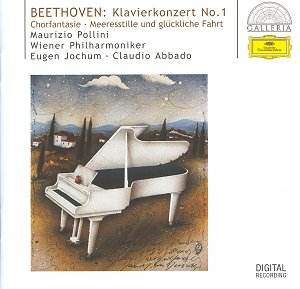Ludwig van BEETHOVEN
(1770-1827)
Piano Concerto No. 1 in C, Op. 15.
Meeresstille und glückliche Fahrt, Op. 112.
Choral Fantasia in C minor, Op.
80.
 Maurizio Pollini (piano);
Maurizio Pollini (piano);
Vienna State Opera Chorus;
Vienna Philharmonic Orchestra Eugen Jochum, Claudio
Abbado.
 DG Galleria 469 549-2
[DDD]
[63'40]
DG Galleria 469 549-2
[DDD]
[63'40]
Crotchet
£7.99 Amazon UK Amazon
US

Pollini is very much the star of this disc. His 'live' recording from Vienna's
Musikvereinsaal in November 1982 of Beethoven's first concerto has always
seemed to me under-rated. True, on first (LP) release there was no coupling,
so that the record was cruelly short at full price. No such problem exists
here, however.
The first two concertos in Pollini's first Beethoven concerto cycle were
conducted by Eugen Jochum (the remaining three were conducted by Böhm).
The beautifully structured opening tutti makes for compulsive listening.
Jochum uses just the right amount of 'give' for the liquid second subject.
Pollini contributes a compendium of his finest attributes throughout the
performance: a staggering technique, great intellect and, in the second movement,
real communion with the players of the Vienna Philharmonic (the clarinet
solos are meltingly beautiful). Pollini's sound is positively glacial, enabling
the most intricate detail to come through. He opts for the long third cadenza
in the first movement, bringing an (uncharacteristic?) wit to its end. If
the Rondo is not entirely 'scherzando', it remains entirely consistent with
Pollini's vision.
The nearest comparison is Martha Argerich's live 1992 performance with the
Concertgebouw Orchestra under Heinz Wallberg on EMI CDC5 56974-2 (coupled
with the Mozart Concerto, K503). The acoustic is less defined than on DG
and the woodwind appear quite distant, but Argerich contributes some quite
magical moments. She opts for the shorter second cadenza.
The Choral Fantasia's sectional structure emerges as a triumph of
logic in the hands of Pollini and Abbado's 1986 performance. The opening
piano cadenza, which can drag on in the wrong pair of hands, here emerges
as a cohesive unit which builds to almost organ-like sonorities after a welter
of unfeasibly even arpeggios. The Vienna Philharmonic seem to give their
all, from the silky woodwind of the magical Adagio ma non troppo to the rousing
March and the ecstatic ending. The chorus is enthusiastic and well drilled,
the soloists well balanced.
Abbado seems to have affection for the rarely heard Meeresstille und
glückliche Fahrt ('Calm Sea and Prosperous Voyage') - many years
ago I heard him conduct a live performance with the LSO at the Barbican under
his baton. The Calm Sea is almost reverentially hushed, and the chorus of
the Vienna State Opera shine in the lively final section. This is not the
greatest of Beethoven's works, but it does deserve the occasional outing.
A well-programmed and rewarding disc that will return often to my player.
Colin Clarke
Performance

Recording


